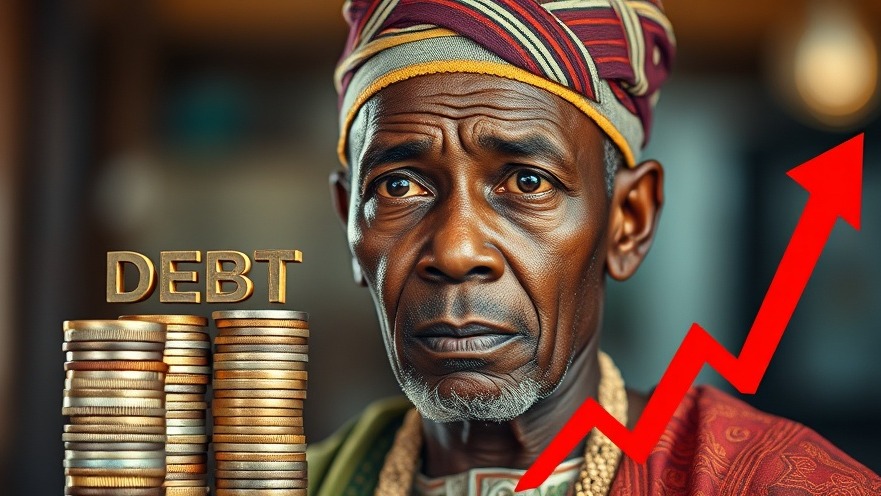
Understanding Nigeria's Burgeoning Debt Crisis
As of now, Nigeria’s public debt has alarmingly surpassed ₦149 trillion, stirring widespread concern among citizens and economic experts alike. The main question that reverberates through this crisis is: where exactly is all this borrowed money going? In an era where fiscal responsibility should be at the forefront of governance, the need for transparency and accountability has never been more urgent.
In 'House of Reps Under Fire as Nigeria’s Debt Hits ₦149 Trillion', the discussion dives into the implications of Nigeria's soaring debt, prompting an examination of critical strategies for fiscal responsibility.
Loan Transparency: Bridging the Trust Deficit
Addressing the ballooning debt requires more than numbers on a balance sheet; it demands engagement from the people. Former House of Representatives member Nicola Sai poignantly articulated this trust deficit. The public’s perception of governance is shaped not just by the promises or projects conceptualized but by the visible impacts these loans are meant to facilitate. Trust can be built when citizens witness their tax money effectively transforming roads, power supply, and key infrastructure. In a landscape where poor roads and unreliable public services dominate, the sentiment surrounding such immense debt becomes understandably skeptical.
Reassessing Infrastructure Spending: A Need for Quick Wins
In discussions about sustainable economic growth, financial analysts like Kawaja emphasize that the government must prioritize quick-wins in infrastructure that can instantly benefit the average Nigerian. Essential projects like road repairs should be rolled out first, amidst grander plans requiring years of investment and construction. This balancing act can create confidence in governance because it shows that immediate needs are being met even while the government tackles longer-term projects.
Looking at the Debt-to-Revenue Ratio
Analyzing Nigeria's economic frailty through the lens of the debt-to-revenue ratio instead of simply focusing on debt-to-GDP provides a more granular understanding of the country’s financial health. Current estimations indicate that up to 83% of Nigeria’s revenue goes towards servicing debt. This alarming statistic reinforces concerns that more borrowing is merely a tactic for settling existing debts rather than an avenue for sustainable growth. Policymakers must now strategically navigate this perilous economic landscape, ensuring that every new loan promises enhanced productivity and bolsters Nigeria's revenue-generating capabilities.
Proactive Governance: Setting the Stage for Future Borrowing
In the context of impending foreign borrowings, the Nigerian government must tread carefully. Lessons from past financial missteps necessitate that parliamentary oversight is strengthened to mitigate the ‘rubber stamp’ reputation of the House. There should be stringent checks in place ensuring that new loans are tied to concrete projects, creating jobs and generating revenues that will facilitate timely repayments. The priorities should be clear: will these loans lead to job creation and improved public services? And importantly, what mechanism of oversight will ensure accountability?
Alternative Funding Avenues: Can Nigeria Learn from Ethiopia?
Notably, Ethiopia has showcased an alternative funding model by financing its Grand Ethiopian Renaissance Dam through local borrowing, preserving its sovereignty and avoiding external debt crisis pitfalls. Can Nigeria replicate such ingenuity? While the complexities of Nigeria's economy differ, reinforcing local bond markets by instilling public trust could potentially foster a funding environment where citizens feel invested in the long-term health of the nation. Innovative funding mechanisms that involve crowd-sourced capital from citizens could pave the way toward infrastructural renaissance without increasing external debt burdens.
Actionable Insights: What Needs to Change?
The time has arrived for decisive action. First, the citizens demand greater visibility into governmental analytics, including the purpose-driven frameworks guiding financial decisions. Secondly, proactive measures must be adopted to create a sustainable economic environment that favors local investment while curtailing dependency on foreign loans. Finally, proactive agendas must highlight projects explicitly tied to job creation and essential infrastructure enhancements, fostering a renewed public trust in governance.
To summarize, Nigeria’s escalating debt calls for a comprehensive reevaluation of public financial management practices, prioritizing transparency and tangible results that meet citizens' needs. Strong leadership and accountability will determine whether the current financial plight spirals into a deeper crisis or transforms into a springboard for national recovery.
 Add Row
Add Row  Add
Add 


Write A Comment